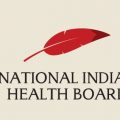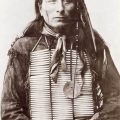
By email to subscribers this morning, the National Indian Health Board‘s Congressional Relations Associate, Bobby Ahern, reported:
The FY 2019 President’s Budget Request for the Indian Health Service, proposes to eliminate funding for the Community Health Representative (CHR) Program and the Health Education program. In the coming weeks, National Indian Health Board (NIHB) will advocate with Congress about the importance of these programs in Tribal communities. NIHB is seeking information from Tribes that provide specific examples that highlight why the CHR program is so critical to Tribal communities. This program has shown that indigenous community members that are trained in the basic skills of health care provision and disease control and prevention, are able to achieve the most success in effecting change in community acceptance and utilization of limited health care resources. The Health Education program provides preventive health education, emergency response & public health, chronic and communicable disease education.
NIHB has an April 6 deadline for response and input from its members. Outsiders (like myself) can subscribe to their emails by scrolling down below the right-hand column headed “2017 Tribal Health Priorities” at this page of their site.
The NIHB is a 501(c)3 tax-exempt non-profit organization advocating and advising on and tracking US legislation affecting Tribes and Tribal governments, on behalf of 566 Federally recognized Tribal governments —both those operating their own health care delivery systems through contracting and compacting, and those receiving health care directly from the Indian Health Service (IHS)— and liaising among them for communication, research, program development and assessment, project management, training and technical assistance to and with Area Health Boards, Tribal organizations, federal agencies, and private foundations working in the interests of Indian country. Mission statement from the website:
Established by the Tribes to advocate as the united voice of federally recognized American Indian and Alaska Native Tribes, NIHB seeks to reinforce Tribal sovereignty, strengthen Tribal health systems, secure resources, and build capacity to achieve the highest level of health and well-being for our People.
See their website’s About NIHB page for tabs and links to their:
- “Who We Are and What We Do”
- ”How NIHB works”
- “NIHB Constitution and Bylaws”
- “Member Organizations”
- “Tribal Resouces”
- “Legislative”
- “Public Health”
- “Behavioral Health”
- “Communications”
- “Career Opportunities”
- DONATION
I myself am not of Native American heritage, nor an employee or volunteer at the NIHB or any of their member organizations/agencies, merely a subscriber and extremely minor donator for some years. I write these reports in DK when I can, as a disabled person —in “previous” life a research librarian for livelihood with decades of volunteerism in community organizations— whose life was kind of saved in 1995 by a social worker of Native American heritage.
And because the website of this organization is an education in itself on the complexities and longterm elbow-grease commitment it takes to be the concrete change you want to see in the world where it’s desperately needed.
Please explore the NIHB website if you have any questions. I hope someday someone does a wikipedia page for them, because there still isn’t one. Meanwhile, anyway, this google search includes a link to their twitter feed.



Leave a Reply